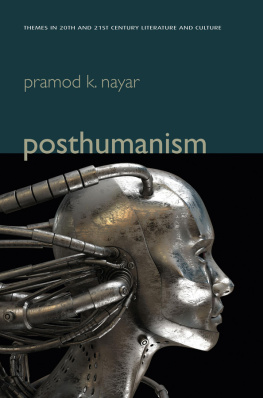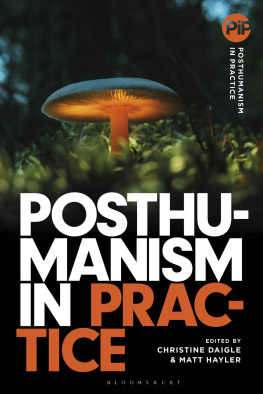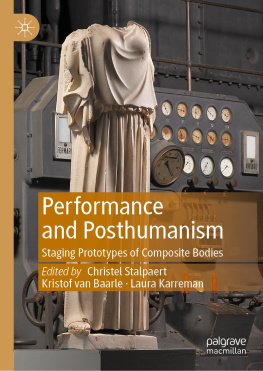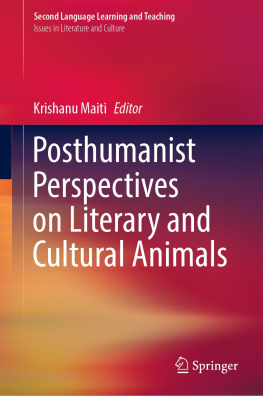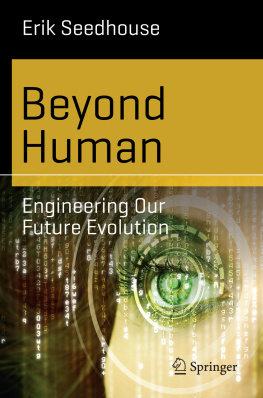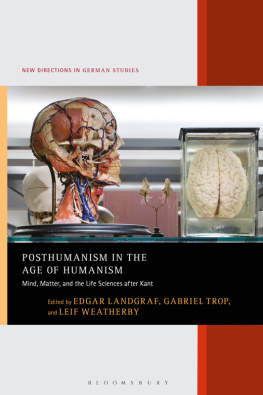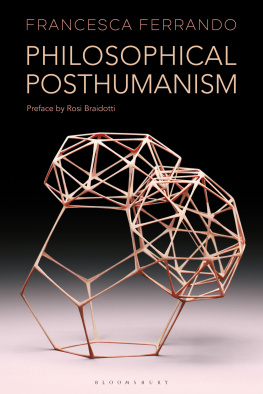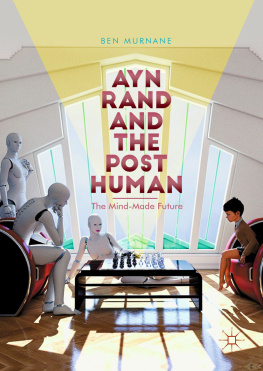
Table of Contents
This book is part of the series Themes in Twentieth- and Twenty-First-Century Literature and Culture:
Series Advisor: Rod Mengham
Tim Armstrong, Modernism: A Cultural History
Alex Goody, Technology, Literature and Culture
Suman Gupta, Globalization and Literature
Richard Lane, The Postcolonial Novel
Pramod K. Nayar, Posthumanism
Copyright Pramod K. Nayar 2014
The right of Pramod K. Nayar to be identified as Author of this Work has been asserted in accordance with the UK Copyright, Designs and Patents Act 1988.
First published in 2014 by Polity Press
Polity Press
65 Bridge Street
Cambridge CB2 1UR, UK
Polity Press
350 Main Street
Malden, MA 02148, USA
All rights reserved. Except for the quotation of short passages for the purpose of criticism and review, no part of this publication may be reproduced, stored in a retrieval system, or transmitted, in any form or by any means, electronic, mechanical, photocopying, recording or otherwise, without the prior permission of the publisher.
ISBN-13: 978-0-7456-6240-4
ISBN-13: 978-0-7456-6241-1(pb)
ISBN-13: 978-0-7456-7685-2(epub)
ISBN-13: 978-0-7456-6590-0(mobi)
A catalogue record for this book is available from the British Library.
The publisher has used its best endeavours to ensure that the URLs for external websites referred to in this book are correct and active at the time of going to press. However, the publisher has no responsibility for the websites and can make no guarantee that a site will remain live or that the content is or will remain appropriate.
Every effort has been made to trace all copyright holders, but if any have been inadvertently overlooked the publisher will be pleased to include any necessary credits in any subsequent reprint or edition.
For further information on Polity, visit our website: www.politybooks.com
Acknowledgements
This book owes numerous debts to institutions and individuals, and select individuals within institutions.
At the University of Hyderabad (UoH), Saradindu Bhattacharya unearthed essays and materials with scrupulous speed and method. Neeraja Sundaram added her bit when called upon to do so. Also, at UoH, Anna Kurian's now-legendary reading of early drafts, conversations and productive disagreements (mostly over the human nature of posthumanism) have with affection and attention shaped this book in ways too many to number.
V. Premlata of Dayalbagh Institute of Education, Agra, invited me to speak on posthumanism at a seminar on interdisciplinarity, following this up with the generous sharing of her collection of books and materials on consciousness studies.
The Indian Council of Cultural Relations gave me a travel grant that helped me take up the Visiting Scholar position for a short but productive period at the University of Dayton, OH, USA in October 2012. Much gratitude goes to the indefatigable Harish Trivedi of the India Foundation, Dayton, OH, for setting the wheels in motion and extending, along with Sharon Trivedi, his superb hospitality. Without him and the India Foundation the trip would not have happened at all. Amy Anderson of the Center for International Programs, University of Dayton (CIP-UD), with customary warmth and quiet efficiency, ensured a perfect stay her friendship, and Bill's, has been singular. Thanks also are due to Tina Manco Newton and Charlotte Hansen at CIP-UD for all the efforts directed at my comfortable stay. Faculty in the English Department of UD, notably Sheila Hughes and Andy Slade, made sure that my lectures and student consultations would not interrupt my (manic) work schedules. Also at Dayton, thanks go to Alpana Sharma and the English Department of Wright State University, and Susana Pea, Dan Shoemaker, Kristen Rudisill, Jeremy Wallach, Esther Clinton, Marilyn Motz, Khani Begum and Matt Donahue at Bowling Green State University for their hospitality and enthusiastic interaction during the stay there in October 2012.
It is a pleasure to sound a special note of gratitude for Ibrahim, the continuingly loyal friend of my school days, for his warm hospitality during the Ohio stint, an effort in which he was aided admirably by his mother, and of course the team of Sadiya, Adil, Aamer and Salman.
Parts of the book appeared in incipient form in various places. Shalmalee Palekar invited me to contribute an essay on William Gibson to Westerly (56.2, 2011: 4861, now incorporated into as well. Posthumanism and species cosmopolitanism was the subject of a plenary talk delivered, thanks to Himanshu Mohapatra's generous invitation, at the Utkal University's Department of English seminar on Topographies of Mind, Society, Culture: Identities and Crossovers in November 2012.
The section on biometrics in began life as an essay in Economic and Political Weekly (96.32, 2012: 1722). The analysis of Lessing's The Fifth Child will appear in Samyukta. My argument about the deracination and domestication of vampires using Stephenie Meyer's trilogy as a case study appeared first in Nebula (37.3, 2010: 6076), and in the case of Octavia Butler's Fledgling, in Notes on Contemporary Literature (41.2, 2011: 610). Notes on Contemporary Literature will also publish my reading of posthumanism in Never Let Me Go in a 2013 issue. The arguments on Frantz Fanon find their origins in my FrantzFanon (Routledge, 2013). Much gratitude to Nandana, Shalmalee and Radhakrishnan for inviting me to contribute and the journals referees for incisive comments on early drafts of the essays.
I am grateful to Andrea Drugan, Lauren Mulholland (then at Polity) and Jonathan Skerrett, my cooperative and encouraging editors at Polity. And to Leigh Mueller's careful copy-editing, I owe many thanks.
To Nandini, Pranav, parents and parents-in-law, for their unstinting support and uncountable prayers, my gratitude, as always.
Revisiting the Human: Critical Humanisms
Shori, the genetically modified vampire, is able to tolerate sunlight and cohabit easily with humans in Octavia Butler's Fledgling (2005). Shori represents a hybrid race, neither human nor vampire, both human and vampire. It is a postgender world in Ursula Le Guin's The Left Hand of Darkness (1969), and one can choose to be man or woman when coming into heat. Le Guin complicates the supposed distinguishing feature of the normal human race, where each body is of a single biological sex, and speculates about genders being interchangeable. In Marge Piercy's Woman on the Edge of Time (1976), troublesome inmates of the mental hospital are implanted with neurotransmitters a theme Piercy borrows from a real-life incident in which, in the 1960s, the staff at Atascadero and Vacaville (California), prisons for the criminally insane, used the drug succinylcholine to modify their patients behaviour that would enable the doctors and nurses to control patient behaviour, mainly by rendering them passive, inert. The inmates remain arguably human but minus the several cognitive, intellectual and emotive abilities we have associated with the normal human. Vampires turn vegetarian and stop feeding off humans in Stephenie Meyer's now-cult Twilight series (20058), and even begin considering a life where they merge into the human race through procreation. In Anne Rice's vampire fiction, vampires live in covens and replicate the family structures of humans. Arnold Schwarzenegger, the alien cyborg, develops, inexplicably, emotional capacities and affiliations in the later
Next page
